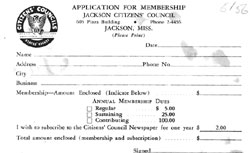White Resistance
It shall be the duty of the commission to do and perform any and all acts and things deemed necessary and proper to protect the sovereignty of the State of Mississippi, and her sister states, from encroachment thereon by the Federal Government?Section 5, Mississippi Legislature, 1956. (#134)
White citizens in Mississippi reacted to the Freedom Movement with legislative initiatives,
state funded organizations, and private groups all designed to maintain racial inequality and
prevent blacks from voting. As the Freedom Movement activists looked to the federal government,
beginning with the Brown v. Board of Education case in 1954 that ordered the desegregation of
public schools,
 whites in Mississippi used the language of state’s rights versus the federal government to argue
for the continuation of segregation. Many of the initiatives first tried in Mississippi spread
to neighboring Southern states.
whites in Mississippi used the language of state’s rights versus the federal government to argue
for the continuation of segregation. Many of the initiatives first tried in Mississippi spread
to neighboring Southern states.
Created in 1956 by the Mississippi Legislature, the Mississippi State Sovereignty Commission employed the philosophy of state’s rights to end the civil rights initiatives of various grass roots organizations as well as those of the federal government. More specifically, the Commission fought to preserve white power and black disenfranchisement which had been a part of the state’s history for centuries. Members of the commission included numerous state political figures (such as the governor, attorney general, president of the Senate) as well as citizens who were appointed by the governor. A listing of the members shows that most state officials were members of the organization which directly worked to maintain segregation. (#150)
The Mississippi state legislature not only created the commission, but
also appropriated state funds to defray the Commission’s expenses.
 Therefore, black citizens, through their taxes, were forced to support the
Commission that sought to keep them subjugated politically, socially, and
economically. The state legislature passed an act specifically allocating
$50,000 to the commission for the “biennium ending June 30, 1964."( #153)
Thus, all taxpayers (black and white) supported this
organization even though it sought to eliminate civil rights activism and maintain segregation in the state and nationwide.
Therefore, black citizens, through their taxes, were forced to support the
Commission that sought to keep them subjugated politically, socially, and
economically. The state legislature passed an act specifically allocating
$50,000 to the commission for the “biennium ending June 30, 1964."( #153)
Thus, all taxpayers (black and white) supported this
organization even though it sought to eliminate civil rights activism and maintain segregation in the state and nationwide.
Other states, including Louisiana and Alabama, used the Mississippi State Sovereignty Commission’s purpose and format as a model to create similar commissions to fight integration and federal government involvement. Cooperation between the three states became formal networks with the founding of the Southern Association of Investigators in 1966 and the Interstate Sovereignty Commission in 1968.
Although the commission originated under the administration of Governor J.P. Coleman,
succeeding governors also used it to support white supremacy. Governor Ross Barnett brought in
national speakers to defend racial segregation while Governor Paul Johnson allowed commission
director Erle Johnston, Jr. to “build up a secret network of confidants and contacts” who kept
him informed of civil rights activity in the state.
 Other legal measures taken by the commission
to curb civil rights activism included the creation of city ordinances prohibiting protests of
any form, determining the lawful use of sidewalks, and the incorporation of the Citizens’
Council.
Other legal measures taken by the commission
to curb civil rights activism included the creation of city ordinances prohibiting protests of
any form, determining the lawful use of sidewalks, and the incorporation of the Citizens’
Council.
The Mississippi State Sovereignty Commission helped form private organizations, the White Citizens’ Councils, to work with them to maintain state’s rights. Prominent white businessmen and other citizens from around the state joined the Citizens' Council. Membership cards helped maintain a sense of comradery.(#75) Citizens' Councils across the state used political and economic threats to maintain segregation. Blacks who registered to vote could have their name and address published in the local newspaper, lose their jobs, have their mortgage foreclosed, and sometimes be physically threatened, all through the Citizens’ Council.
Though the Citizens’ Council began in Jackson, Mississippi shortly after the creation of the State Sovereignty Commission in 1956, its rhetoric, which encouraged whites to take back America, spread to other states and chapters were established nationwide. For an example of the philosophy of the Citizens’ Council see the flyers published to encourage membership (in the early 1950s) and the advertisement published in Atlantic City during the Democratic Convention in 1964. (#85, #152) The councils held forums and conferences across the nation and published a nationally circulated newspaper.

In 1961, William Higgs, a white Mississippi attorney, filed suit on behalf of himself, R.L.T. Smith, and all black citizens and taxpayers of the state against the Citizens’ Council and Mississippi State Sovereignty Commission for their unconstitutional and illegal use of state funds. The suit also stated that the “Citizens’ Council and Citizens’ Council Forum are organized solely for the purpose of advocating and actively assisting in resistance and violation of the 14th Amendment -- as they [blacks] secure equal treatment and facilities.” In 1968, the Citizens’ Council rebuilt its headquarters in Jackson, MS. As many southern states succumbed to federal mandatory school desegregation measures in the late 60s and early 70s, the Citizens’ Council established private council schools for white children, to prevent them from having to attend school with black children.
Related Documents
House Bill 880, Mississippi State Legislature, 1956List of State Sovereignty Commission members, 1960-64, Mississippi State Legislature, 1964
Act to Fund State Sovereignty Commission, Mississippi State Legislature, 1964
Citizens’ Council Membership Cards, Jackson, Mississippi, 1965
Flyers, Citizens' Council, Greenwood, Mississippi
Newspaper Advertisement, Citizens Council, 1964
Political Cartoon, Jackson Daily News, 1962